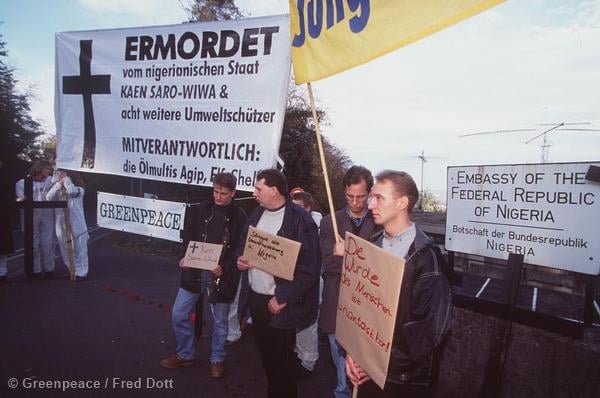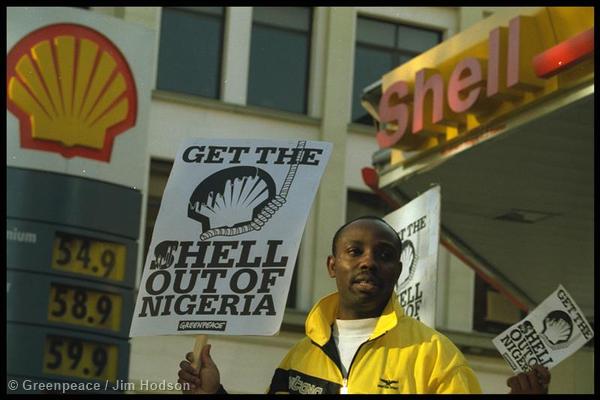
New settlement for oil spills in 2008 and 2009 reaches $83 million, while contamination from hundreds of past spills continues to pollute water sources and land in the Niger Delta region of Nigeria.
Oil operations, spills, and leaks have devastated Ogoniland, a 1,000km kingdom in the Niger Delta, and the livelihoods of the Ogoni people who are predominantly farmers and fisherpeople.
Shell operated in Ogoniland from 1958 to 1993, ceasing production in the face of public protests. While no longer actively operating, Shells equipment has yet to be fully decommissioned and dismantled. Shells own data from 1997-2006 indicates approximately 250 oils spills per year in the Niger Delta.
Environmental Devastation
It will take 25-30 years to treat and clean up the environmental damage in Ogoniland, according to the United Nations Environmental Programme.
The Nigerian government invited the United Nations Environment Programme (UNEP) to assess Ogoniland and the effects of long term oil operations. UNEP began their study in 2009 and published a reportin 2011, finding the area to be heavily polluted including contaminated drinking water in at least ten communities; a layer of oil floating on groundwater which serviced wells; and oil seepage into soil. UNEP’s report recommended emergency action and outlined an action plan with further recommendations. Recommendations for emergency action included providing clean drinking water and raising public awareness of contamination of drinking water and groundwater. Longer term recommendations included an oil industry review of and improvement upon spill clean-up methods and remediation procedures, and establishing better communication with the Ogoni people. UNEP also called for the establishment of, at minimum, a $1 billion fund for environmental restoration projects, to be financed by the Nigerian government and the oil industry.
Three years after UNEPs report was published, a group of organizations including Amnesty International and Friends of the Earth investigated the state of affairs in Ogoniland and the implementation of UNEPs recommendations. They foundnone of UNEPs recommendations have been fully implemented.
Bodo Oil Spills
Oil spills due to failures in pipeline operations, beginning in 2008 and continuing into 2009, directly affected Bodo in Ogoniland. Shell initially offered $6,000 in compensation to the community, according to attorneys representing affected people in Bodo, and provided low estimates of the magnitude and impact of the oil spills. Bodo community members began legal action against Shell in 2011, through British courts.
Settling out of court in January 2015, Shells $83 million settlement will be distributed to 15,600 people in Bodo affected by the spills. The majority of the settlement will go to individuals, with the community-at-large also receiving part of the settlement. British banks will distribute funds to bank accounts set up for each affected individual in Bodo. Shell has stated they are happy with the Bodo settlement, and are committed to the clean-up process which they say has been delayed because of division within the community in Bodo.
Encouraged by the results of legal action taken in the United Kingdom, communities outside Bodo are now reportedlyconsidering taking action against Shell through British courts.
Human Rights
Shell has been accused of human rights violations against the Ogoni people, and accused of complicity in the 1994 arrests, and 1995 executions by hanging, of nine Ogoni men. The nine men were part of the Movement for the Survival of the Ogoni People (MOSOP), and non-violently campaigned against environmental degradation caused by oil operations, and for greater Ogoni autonomy. Their names follow: Baribor Bera, Barinem Kiobel, Daniel Gbooko, Felix Nuate, John Kpuine, Ken Saro-Wiwa, Nordu Eawo, Paul Levera, Saturday Dobee.
Today, the Ogoni people are involved in two grim wars. The first is the 35-year-old ecological war waged by the multinational oil companies, Shell and Chevron. In this sophisticated and unconventional war the men, women and children die; flora, fauna and fish perish, the air and water are poisoned, and finally, the land dies. The second war is a political war of tyranny, oppression, and greed designed to dispossess the Ogoni people of their rights and their wealth and subject them to abject poverty, slavery, dehumanisation and extinction.
– Ken Saro-Wiwa
The executions caused international outrage.
Greenpeace actions in protest of the death sentences and executions of nine Ogoni men, including activist Ken Saro-Wiwa. From top left: USA, Germany, London, Zurich.
In 1996, a lawsuit was filed against Shell by multiple plaintiffs, many of them relatives of the nine executed Ogoni men. Shell settled out of court in 2009, agreeing to pay $15.5 million with part of the settlement setting up a trust fund for the Ogoni people. The settlement was a humanitarian gesture according to Shell, and not an admission of guilt.
More on the arrest of Ken Saro-Wiwa and the history of Shell in the Niger Delta.
Looking to the Future
Shell has repeatedly demonstrated it does not prioritize the safety and security of the communities and environments in which it works. Compensation after the fact is not enough.
Shells $83 million will aid those in Bodo who have had their livelihoods, community, and lives threatened; however, the longstanding environmental degradation in Ogoniland from decades of oil operations remains. Contaminated soil, groundwater, and drinking water remain. The effects of this pollution, including human health effects and effects on vegetation, remain.
As we look to the future, including Shells planned oil exploration in the Arctic, how can we expect Shell to act responsibly? If Shell wont take action to clean up damage in the Niger Delta, how can we expect Shell to take responsible action and care in the challenging and unique Arctic environment?
Learn more about why Shell and all fossil fuelcompanies should be prohibited fromdrilling in the Arctic, and what you can do to save this pristine place.




